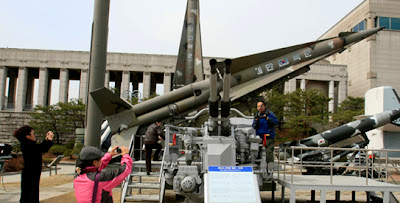SEOUL:South Korea accused North Korea Monday of trying to develop a nuclear-armed missile through a satellite launch next month, after Pyongyang dismissed international calls to abandon the exercise.
“Our government defines North Korea’s so-called working satellite launch plan as a grave provocation to develop a long-distance delivery means for nuclear weapons by using ballistic missile technology,” said presidential spokesman Park Jeong-Ha.
The North announced Friday it would launch a long-range rocket between April 12 and 16 to put a satellite into orbit for peaceful purposes.
The United States and other nations see the exercise as a thinly veiled long-range missile test, which would breach a United Nations ban and violate last month’s denuclearisation deal with Washington.
The North is thought to have enough plutonium for perhaps six to eight nuclear weapons, but it is unclear whether it can yet build an atomic warhead for a missile.
The launch is timed to coincide with mass celebrations marking the 100th anniversary of the birth of founding president Kim Il-Sung.
It will come just after an April 11 election in which the South’s ruling conservative party — bitterly opposed by Pyongyang — seeks to retain parliamentary control.
The issue could also overshadow next week’s Seoul nuclear security summit, to be attended by US President Barack Obama and other world leaders.
Seoul said it would work closely with the United States, Japan, China, Russia and the European Union to handle the issue during the summit, the biggest-ever diplomatic gathering in the South.
The North on Sunday rejected international protests, calling the criticism “a base move … to encroach upon our sovereignty.” Ruling party newspaper Rodong Sinmun Monday blasted Seoul for an “unprecedented policy of sycophancy” towards Washington.
The launch by the impoverished but nuclear-armed state seems likely to kill off a February 29 agreement with Washington, which had raised hopes of eased tensions under young new leader Kim Jong-Un.
The North agreed to suspend its uranium enrichment programme, along with long-range missile launches and nuclear tests, in return for 240,000 tonnes of much-needed US food aid.
It maintains that a satellite launch is not a missile test.
But the US State Department has called the plan “highly provocative” and voiced strong doubt over providing the food if the launch goes ahead.
Japan, Russia and UN Secretary General Ban Ki-moon have called for a change of heart and even China, the North’s closest ally, expressed concern.
The North’s first nuclear test in October 2006 came three months after a long-range rocket launch.
Its most recent such launch on April 5, 2009, purportedly to put a satellite into orbit, brought UN Security Council condemnation and tightened sanctions.
The North quit six-party nuclear disarmament talks in protest at the censure and conducted its second atomic weapons test in May 2009.
Some analysts see a similar scenario this time.
“Seen in the previous cases, North Korea has a pattern of conducting nuclear tests after missile tests,” Yun Duk-Min, of the South’s Institute for Foreign Affairs and National Security, told the Korea JoongAng Daily.
Seoul’s defence ministry also suggested a nuclear test may follow the launch.
“We will thoroughly guard against potential additional military provocations or a nuclear test, as the North is highly likely to repeat its actions back in 2009 when it fired a long-range rocket,” a spokesman told a briefing.
He said the South and its US ally would intensively monitor areas around Tongchang-ri, the North’s new launch site in the extreme northwest.
The North said it has notified international aviation and maritime bodies of the flight path. Media reports said the first stage was projected to fall about 140 kilometres (87 miles) off the South Korean coast, in international waters between China and the South.
The second stage was tipped to splash down 190 km east of the Philippines.





